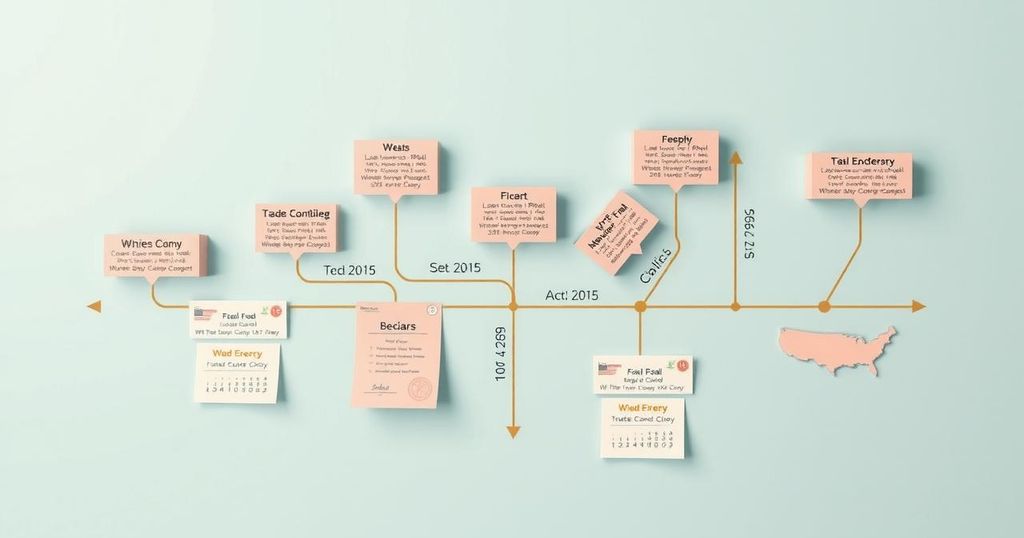The article outlines the timeline of the trade war initiated by President Trump, detailing the escalation of tariffs against key trading partners, the background of previous trade disputes, Biden’s continuation of certain tariffs, and the broader implications for the global economy leading up to and following the 2024 presidential elections.
The recent trade dispute initiated by President Donald Trump marks a significant escalation in international trade tensions, with tariffs imposed against major partners: Mexico, Canada, and China. Following his inauguration in January, Trump announced substantial tariffs, reviving strategies reminiscent of his earlier term. Economists warn that this trade war could adversely affect global businesses and lead to increased consumer prices, creating a climate of uncertainty within the marketplace.
Trump’s first term featured heightened tariffs particularly aimed at China, resulting in an extensive exchange of levies affecting goods worth billions. The conflict arose from U.S. accusations of China’s unfair trade practices, including intellectual property theft. In an effort to protect American interests, Trump introduced broad tariffs and renegotiated trade agreements such as the USMCA.
Under President Joe Biden, many tariffs, particularly those on China, remained intact, though he adopted a more calibrated approach. Biden imposed new restrictions on semiconductor exports and further increased tariffs on specific products, thereby directly confronting China’s trade strategies. As both political parties position themselves for the 2024 elections, trade policy has become a contentious issue, with both candidates showcasing their toughness on China.
Following Trump’s election victory in November 2024, he pledged to implement even stricter tariffs upon retaking office, including a notable 25% tariff on imports from Mexico and Canada. This move has raised concerns about its potential impact on the USMCA agreement and provoked strong reactions from affected countries, while instigating retaliatory tariff measures.
On February 1, Trump signed an executive order enforcing substantial tariffs, framing it as a national emergency linked to border security. This led to immediate backlash and countermeasures. Macron Pacific, both Mexico and Canada, sought to negotiate terms to alleviate tariff concerns, yet the situation maintained a tenuous peace as retaliatory tariffs were contemplated.
As of March 2025, Trump’s tariffs are seeing implementation with widespread ramifications. Countries across North America and beyond are preparing retaliatory actions, exemplifying the severe global market implications of this renewed trade war. Amidst ongoing negotiations and tensions, the financial climate remains uncertain, prompting concerns over its effects on economic growth and consumer stability.
In summary, President Trump’s revival of trade wars through aggressive tariff policies against Mexico, Canada, and China has generated significant economic implications both domestically and abroad. This renewed conflict has prompted strong retaliatory measures from affected countries, further destabilizing international trade relations. As political actors prepare for the upcoming presidential elections, tariffs continue to be a core issue that could shape economic policies and consumer experiences.
Original Source: apnews.com




